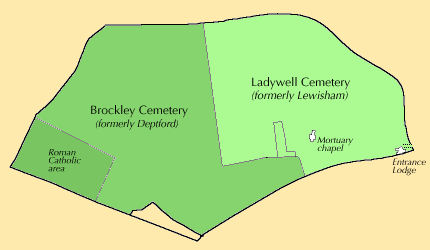On the Ladywell entrance path to the dissenters chapel in Brockley and Ladywell Cemeteries stands the headstone of Elizabeth Colgate. It can be seen from the main path towards the left just before you reach the chapel.
The headstone commemorates a remarkable political and social activist of the Victorian era who campaigned against the key social injustices of the day: war and slavery.
Origins and early life
Elizabeth Colgate was born 28 June 1834 at Brockley Green Farm, Brockley. Her father George Colgate was a farmer, like his father David before him, and her mother Jane (nee Love) was the daughter of a farmer. Together, they had seven children: Frances (1822-1840); George (1825-1855); Ellen (1826-1918); Jane Love (1929-1892); William (1831-1831); Elizabeth (1834-1918) and Julia (1842-1912).
In the eighteenth century, the Colgates were Baptist farmers at Sevenoaks, Kent. Elizabeth’s paternal grandfather David moved to Brockley Green and continued to farm there. His brother Robert emigrated to the United States in 1798, where his son William, first cousin to Elizabeth’s father George, founded the Colgate toothpaste business.
Olive Leaf Societies, World Peace and Elihu Burritt
Olive Leaf Societies were established by Elihu Burritt (1810-1879) in the 1850’s and Elizabeth became an activist. The Societies were to provide funds for his League of Universal Brotherhood (founded 1846), a global peace movement. As well as advocating peace and stronger commercial ties between nations, the League was an anti-slavery campaigner.
 |
| Elihu Burritt (1810-1879 |
The 1851 Census show that Burritt, who often stayed in the houses of his supporters when travelling in England, was staying with the Colgate family. This is important because it shows a direct personal link between Burritt and Elizabeth Colgate.
In Britain, the Societies became a 150 strong national network of local all-women activists. As well as discussing the issues of the day, the circles produced goods for sale at anti-slavery fairs where people could buy items not made by slave labour.
Burritt recognised the key role played by women like Elizabeth Colgate who were invaluable fundraisers and educators, if not full members of the Brotherhood. He noted in one of his letters that Elizabeth was ‘very active’ in the Olive Leaf Societies.
Photographic colourist
The 1861 Census shows Elizabeth and Sister Ellen both living at Brockley Green Farm. Fascinatingly, there were both employed as photographic colourists. The two women were pioneers in a new industry-photography- and they were also pioneers in that as middle-class women they were engaged in paid employment.
By 1871 Elizabeth’s situation had changed. Together with her mother and sister Ellen, she was living at 2 Tunbridge Villas, Lewisham village where she was still living in 1881.They are listed as living on their own monies. It is not clear where these monies came from, but it seems likely that it was related to the sale of the 95 acre family farm bought by the Croydon Railway Company who opened the nearby Brockley train station in 1871.
Later activism
In 1874, Elizabeth was a founder member and secretary of the Women’s Peace and Arbitration Auxiliary. The Auxiliary was initially part of the London Peace Society. The Society was a British pacifist organisation active from 1816 to the 1930s.
In 1891, still living in Lewisham, she also published an account of the Olive Leaf Societies together with a letter of 1853 written to her from Richard Cobden, champion of free-trade and peace, addressed to “Miss C, Convenor” of an Olive Leaf Circle in the pacifist newsletter Concord (1 March). She had also sent the same letter to the Women’s Suffrage Journal in 1871 which might suggest she was sympathetic to, or an early supporter of, women’s suffrage.
Final years and death
By the time of her death on 16 October 1918, aged 84 years, she resided at 39 Wolfington Road, West Norwood. She had still been living with her sister Ellen who died earlier that year on 23 April.
Elizabeth did not marry and had no children. She bequeathed her estate to her sister Julia’s children.
As Baptists the Colgate family were non-conformists, Elizabeth and Ellen’s burial place is in the dissenter’s area of Brockley and Ladywell cemeteries.
Like many women, Elizabeth Colgate has been overlooked by historians. There was no obituary in The Times and she does not feature in the in the Oxford Dictionary of National Biography. Yet clearly there is more to know about her. I do hope that other historians will take a deeper interest in her and the issues she engaged in which are still relevant today.
 | ||
| The Colgate family history is featured in Anthony Watson's 2017 book. |
Thanks to Julie Robinson, former Local Studies Librarian London Borough of Lewisham, Committee Member Friends of Brockley and Ladywell Cemeteries. August 2021 for this article.

